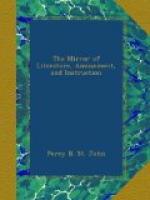A “Manager."—Colley Cibber gives the following spirited description of a famous theatrical manager in his day; “That he was as sly a tyrant as ever was at the head of a theatre, for he gave the actors more liberty, and fewer day’s pay than any of his predecessors; he would laugh with them over a bottle, and trick them in their bargains; he kept them poor, that they might not be able to rebel; and sometimes merry, that they might not think of it”
Newton’s Weather Wisdom.—Sir Isaac Newton was once riding over Salisbury Plain, when a boy, keeping sheep, called to him—“Sir, you had better make haste on, or you will get a wet jacket.” Newton looking round and observing neither clouds nor speck on the horizon, jogged on, taking very little notice of the rustic’s information. He had made but a few miles, when a storm suddenly arising, wetted him to the skin. Surprised at the circumstance, and determined, if possible, to ascertain how an ignorant boy had attained a precision and knowledge in the weather, of which the wisest philosophers would be proud, he rode back, wet as he was. “My lad,” said Newton, “I’ll give thee a guinea if thou wilt tell me how thou canst foretell the weather so truly.” “Will ye, sir? I will then,” said the boy, scratching his head, and holding out his hand for the guinea. “Now, sir,” having received the money, and pointing to his sheep, “when you see that black ram turn his tail towards the wind, ’tis a sure sign of rain within an hour.” “What,” exclaimed the philosopher, “must I, in order to foretell the weather, stay here, and watch which way that black ram turns his tail?” “Yes, sir,” replied the boy. Off rode Newton, quite satisfied with his discovery, but not much inclined to avail himself of it, or to recommend it to others. W.G.C.
Primitive Lamp.—The inhabitants of the Landes, in the south of France, being cut off from the rest of the world, have it not in their power, except when once or twice a year they travel to the nearest towns with their wool, to purchase candles; and as they have no notion how these can be made, they substitute in their place a lamp fed with the turpentine extracted from the fir-trees. The whole process is simple and primitive. To obtain the turpentine, they cut a hole in the tree, and fasten a dish in it to catch the sap as it oozes through, and as soon as the dish is filled, they put a wick of cotton into the midst of the liquor, and burn it as we do a lamp. W.G.C.
Turning the Back.—In this and all countries of Europe, to turn the back upon persons of rank or in authority, is considered highly improper; a striking instance of which may be seen in the mode in which messengers from the Lords retreat along the floor of the House of Commons. In the interior of Africa it is quite otherwise. There the court assemble round the sovereign invariably with their backs to him. T. GILL.
A gentleman having frequently reproved his servant, an Irish girl, for boiling eggs too hard, requested her in future, to boil them only three minutes by the clock. “Sure, sir,” replied the girl, “how shall I do that, for your honour knows the clock is always a quarter of an hour too fast.” W.G.C.




